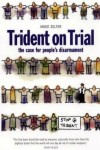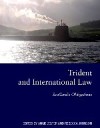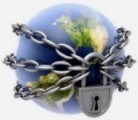‘We are at a time in human history when many global crises have come together – nuclear proliferation, climate change, economic melt-down, pollution, deforestation, massive extinction of other life-forms, and desertification. The issues are intertwined in many complex ways and no single nation can solve the problems alone. Many millions of our fellow global citizens are already suffering from chronic poverty and violence in degraded and exploited environments. There has never been a time when international humanitarian law is so sorely needed. International humanitarian law, if respected and upheld by the world community of nations, if applied to the powerful states as well as to the less powerful, has all the elements that can help us through these troubled times. In essence they are very understandable and accessible to all. A child can read the Declaration of Human Rights and understand the basic humanity and morality they encapsulate. The problem arises when states manipulate the international structures and laws, twisting them to serve their own narrow self-interests and thus ironically subverting the very security they are trying to ensure. This is very apparent when looking at the Non-Proliferation Treaty and the lack of progress on nuclear disarmament, as many of the contributors to this book spell out.
International Humanitarian Law is a powerful tool that if respected and used with integrity can deliver nuclear disarmament. Scotland is key to this process. In the next few years Scotland can insist that all nuclear weapons leave their land and that a clean up of all nuclear materials is carried out. Scotland can call upon other states to back it in its refusal to be drawn into what many consider to be preparations for war crimes, crimes against humanity and crimes against the peace. A strong stance on this issue would open the way for the UK to disarm as this would surely be an easier and more honourable way forward than facing the diplomatic and legal controversy and crisis that would emerge if it did not respect Scottish demands to be nuclear free.
Powerful nations, have a tendency to act above the law and to abuse power, which is why there is a need for a strong civil society to keep track and pressure Governments to uphold international humanitarian law. This has been difficult as there is a great deal of official and public cynicism about law in general and international law in particular, epitomised by views that the law serves the powerful in society, does not look after the interests of the poor or weak, and is the law of the victors over the vanquished.
However, International Humanitarian Law is based on powerful foundational ideas of protection of the weak and powerless and of the environment. The Geneva Conventions, and other war laws, are good agreements that, if implemented, would keep warfare and conflicts within bounds, so that civilised life can be rebuilt after violent conflicts have ended.
And the public’s role has been recognised for a long time. The Martens Clause1, states that when cases are not covered by international agreements,
“civilians and combatants remain under the protection and authority of the principles of international law derived from (among other things) the dictates of public conscience”.
In other words, the law derives from the ethical foundations of our society – from our consciences. And we need to be continually involved in refining our consciences in the light of current affairs. We need to realise that the law evolves, it is not static and we, as civil society, have a part to play in this. It cannot be left to government’s or to the legal profession alone to bear this burden.
The Scotsman, Sir David Maxwell-Fyfe, a former Attorney General under Churchill, was the UK prosecutor at Nuremberg. In 1946 he said,
“The law is a living thing. It is not rigid and unalterable. Its purpose is to serve mankind, and it must change and grow to meet the changing needs of society. The needs of Europe today have no parallel in history.” 2
I would re-iterate and modernise this to say: the needs of our interdependent, conflict-ridden world today have no parallel in history—international law must be strengthened and implemented and evolve to serve all of humankind.
It is this sentiment that has informed much of civil society’s creative involvement with international law. Rather than seeing it as an institution set in stone and way above us as part of the higher-level power struggles between mighty nations, many of us in civil society have engaged with international law as part of our attempts to humanise the State and its institutions and bring it into line with our ‘public consciences’. We3 attempt to get our governments to comply and implement international law and also to develop it for the benefit of humanity as a whole and not for the narrow self-interests of a particular nation state. We often represent ourselves in the courts and try to express ourselves in plain language rather than using Latin phrases and long sentences that are hard to understand. We try to uncover power politics and remind the courts of the underlying principles and spirit of the law.
But there are serious challenges.“International law is not real law and does not apply in Scotland” - thus said a Procurator Fiscal in Helensburgh District Court in 19994, and although not often so frankly articulated, nevertheless this is still an attitude prevalent in the courts at all levels when applied to cases involving protests against nuclear weapons. It is accompanied by impatience and strong disapproval of ordinary citizens meddling in the law, and a belief that ‘amateurs’ should not try to ‘uphold’ the law or ‘take the law into their own hands’. We are told over and over again not to get involved, that it is up to the government, or the police, or the military, or some other institution, to deal with crimes against peace or war crimes. In the UK, there are outdated judgements that hold our society back, like that of Hutchinson5 which misinterprets the ICJ’s Advisory Opinion, or Chandler6 which relies upon the principle of the Royal Prerogative7 to insist that the disposition of the armed forces is not justiciable, that it is not for judge or jury to decide what the armed forces can or cannot do. In effect, these judicial ‘precedents’ have prevented the courts from acting as a necessary balance to the power of the executive and ensured that they do not do their job of judging whether the armed forces are acting within the law. This lack of judicial oversight has allowed our State to cover up their illegal acts.
However, civil society acts in the belief that the strength and wisdom of a society lies with its people and that we get the government and legal system that we allow. We believe we are not completely powerless but are responsible individuals. Thus we cannot stay silent or be still when we can see gross crimes being committed in our names. We see the active deployment of weapons of mass destruction and know that the use of such weapons would break the fundamental principles of humanitarian law. Taking the law seriously we call our institutions to account. We become part of the forces creating the evolution of our society, taking a part in shaping the law and ensuring its implementation.
There have been numerous examples of civil society attempts to get governments to comply with and develop international law. They can be categorised as three broad routes.
One route is campaigning and lobbying, on both national and international levels, to get international law modernised and developed. For instance, the International Campaign to Ban Landmines was a particularly successful example of civil society groups combining together to campaign for a new Treaty. From its small beginnings in 1991 it took a mere 8 years for the Mine Ban Treaty 8 to be formulated, ratified and become binding in international law. It is a wonderful example of what dedicated ‘global citizens’ can persuade governments to do.
The International Campaign to Abolish Nuclear Weapons (ICAN) provides a current example of attempts to develop international law. ICAN is calling on all nations to negotiate a Nuclear Weapons Convention (NWC) to ban nuclear weapons and ensure their elimination. They argue that an NWC is more likely to succeed than a series of fragmented and inconsistent approaches to nuclear disarmament.9
A second route tries to get national and international institutions to comply with the existing international laws—either through education and lobbying or through the legal system.Thus civil society groups, like the Institute for Law, Accountability and Peace, produce briefing papers on what laws are being broken and how10, encourage debate, lobby, and urge their governments to uphold international law by suggesting various policy changes like stopping the export of arms to repressive regimes, refusing to send troops to invade other countries, voting in the UN appropriately. They hold conferences and organise demonstrations.
Individuals and groups also use the legal system in various ways either to judicially review government decisions like the export of arms to various repressive regimes11 or to take out cases that attempt to get the legal system to indict government and military leaders involved in or complicit in war crimes, crimes against the peace, crimes against humanity, or in preparations for such crimes. For instance, in the 1980’s at the height of the nuclear weapons escalation during the Cold War, there were attempts to prosecute the UK Prime Minister for conspiracy to commit war crimes12 but the courts rejected these attempts as ‘malicious’ litigations or by stating that they were not prepared to review the decisions of the Attorney General. Most of these attempts were made by ordinary citizens representing themselves directly in the courts.
However, groups also employed lawyers to advise them and to take cases on their behalf. Thus, law firms like Public Interest Lawyers13 worked with CND to take the Government to court to ask for an advisory opinion on the legality of using Resolution 1441 as a pretext for war14 , and also with the Gentles & other parents of British soldiers killed in Iraq who brought a judicial review of the Government’s failure to order an independent inquiry into the events leading to the decision to invade Iraq. More recently the Nuclear Information Services asked for a Judicial Review of the decision to renew the Trident nuclear weapon system15.
Attempts to bring to justice those in power have continued over many years and each time civil society gains in strength. Whereas the attempts in the ’80’s hardly made an impact on society at large, more recent attempts have had a profound impact on debate and feelings in the country. The CND sponsoredcoalition of law professors and leading NGOs who served notice16 in 2003 on Blair, Hoon and Straw that they would be investigated by the ICC Prosecutor if the UK breached International Humanitarian Law during any proposed use of force against Iraq fed into the huge anti-war protests that led to the largest demonstration in British history17. This is being followed up with reports being sent to the International Criminal Court.
International Law has now become a prominent part of public debate. These continuing legal challenges are a part of the process of bringing our society into line with humanitarian law. Civil society is often well ahead of institutional changes thus legal challenges may not work at any one particular time. Nevertheless, they often succeed at a later date when attitudes have changed and the institutions have caught up. Thus courts must continually be presented with the opportunities to implement international humanitarian law and to act independently of the executive.
On a more international level, we must not forget that it was a global civil society initiative, that eventually drew in international lawyers, that pressed successfully to get the UN to ask the International Court of Justice for their advisory opinion on nuclear weapons in 199618 and which has formed the bulk of our discussions today. It was successful because it engaged with citizens in many different nations of the world community and in the end, try and they did, the powerful national governments (those with nuclear weapons) were not able to stop the process.
A third route is direct citizen’s implementation of international law. For example, through disarmament attempts by civil society wishing to prevent weapons being sent out or used where there is evidence that international law will be broken and civilians injured or killed.
Thus, there have been nonviolent direct actions to disable weapons being exported to repressive regimes like the British Aerospace Hawk Jets to Suharto’s Indonesia in 1996 that were being used to commit genocide amongst the hundreds of unique tribes in East Timor19 or the Trident Ploughshares disarmament actions, like the throwing into Loch Goil of the vital equipment used to test Trident nuclear armed submarines in 199920. Then more recently, the incursions onto US war-planes going out to Iraq and also supplying weapons to Israel in its bombing of civilian targets in Lebanon in 200621 and the extensive damage done to the offices and equipment of the Brighton based MBM factory that supplied arms to Israel whilst it was bombarding civilians in Gaza in January 200922.
Whereas my own acquittal in 1996 after disarming the BAe Hawk Jet was the first such acquittal in the world of a ploughshares action and caused a great deal of controversy, there have now been many more in Ireland, the USA, Australia and in the UK. There are more groups and individuals taking responsibility for nonviolent citizen crime prevention. They are preparing and documenting their evidence carefully, bringing in affected victims of the atrocities as witnesses and getting the context of their actions and their motivations before juries. They are relying upon international law and their national legal right to prevent crime. Judges and Juries are listening to the arguments and the witnesses carefully and in many more cases acquitting the citizen disarmers on the grounds that they had good reasons for their actions – acting in the public interest in other words.
There are now a growing number of European and International wide coalitions of ‘global citizen crime preventors’ that are working together to try to counteract the power of the global military-industrial machine as can be seen, for instance, in the recent blockades at Faslane and Aldermaston.23
Thus civil society has already been playing a vital role in the implementation and development of international law. I believe we are still needed.
Somewhere in the section of the website where we talk about actions we should have a reference to the F365 book saying:-
For ideas and inspiration for actions and blockades you could look at
‘Faslane 365 – a year of anti-nuclear blockades’ edited by Angie Zelter. You can order it from http://www.tridentploughshares.org/article1533
1The Martens Clause was first included in the Hague Convention of 1899, and is found more recently in Article 1, paragraph 2, of Additional Protocol I of 1977 with the wording ‘civilians and combatants remain under the protection and authority of the principles of international law derived from established custom, from the principles of humanity and from the dictates of public conscience’.
2International Military Tribunal, The Trial of German Major War Criminals. Proceedings of the International Military Tribunal Sitting at Nuremberg, Germany. Part 22. 28th August 1946. Taken from the Official Transcript. Published by HMSO, London, 1950. P.243.
3’We’, here and throughout this paper, refers to many in the peace movement and other social change movements and indicates that it is felt by the author to be not only her own opinion but an opinion shared by many of her colleagues.
4See ‘Trident on Trial – the case for People’s Disarmament’ by Angie Zelter, Luath Press. ISBN1-84282-004-4.
7A recent articulation of this can be seen in the March 2002 letter from Rt. Hon Adam Ingram Minister of State for the Armed Forces who stated, ‘The right of her Majesty’s Government to prosecute military operations abroad is not derived from statute but from the common law, and is exercised under the Royal Prerogative. Powers under the Royal prerogative are those uniquely enjoyed by the Crown and exercised on its behalf by Ministers. The conduct of foreign affairs, including the commitment of forces for military operations, is carried out in reliance on the prerogative.’
8The Mine Ban Treaty is the international agreement that bans anti-personnel land-mines. Sometimes referred to as the Ottawa Convention, it is officially titled: the Convention on the Prohibition of the Use, Stockpiling, Production and Transfer of Anti-Personnel Mines and on Their Destruction. The treaty aims to rid the world of the scourge of mines and deals with everything from mine use, production and trade, to victim assistance, mine clearance and stockpile destruction. In December 1997 a total of 122 governments signed the treaty in Ottawa, Canada. In September the following year, Burkina Faso was the 40th country to ratify, triggering entry into force six months later. Consequently, in March 1999 the treaty became binding under international law, and did so more quickly than any treaty of its kind in history.
10See http://inlapwcp.webplus.net/index.html for a sample of the kinds of legal briefings that one civil society group INLAP have produced.
11http://www.caat.org.uk/press/press-release.php?url=101203prs - Legal action launched against UK Government’s arms to Indonesia policy - press release issued jointly by TAPOL and Campaign Against Arms Trade (CAAT) on 10 December 2003- ‘A human rights activist from Aceh, Indonesia has today launched proceedings against the UK Government challenging by Judicial Review the legality of the UK’s supply of arms to Indonesia. Mr. Aguswandi claims the continued licensing of military exports to Indonesia breaks UK and EU export control laws which clearly state that export licences for weapons should be refused if there is a risk of the equipment being used for internal repression.’
12With the Pax Legalis cases (see ‘The Pax Legalis Papers: Nuclear Conspiracy and the Law’, Robert Manson, ISBN 1897766181, Jon Carpenter) and the Snowball information layings (private papers with Angie Zelter).
13Established in 1999. http://www.publicinterestlawyers.co.uk/
14This was, comprehensively argued by Rabinder Singh, QC and Charlotte Kilroy, acting for CND. The three judges ruled that they could not give an opinion as they had no jurisdiction on this aspect of international law and that it may be ‘damaging to the public interest in the field of international relations, national security or defence.’ The same CND legal team produced an opinion on why the proposed draft ‘2nd resolution’ would not give legal authority to go to war. They also wrote an opinion on the Attorney General’s use of Resolutions 678,687 and 1441 to authorise the war, both on the eve of war and after it became clear that weapons of mass destruction were not being found in Iraq.
15In the High Court on 26th January, Lord Justice Scott Baker refused NIS permission to appeal Mr. Justice Simon’s decision of 10th June 2008 not to grant permission to claim Judicial Review of the Government’s 2006 Defence White Paper and its decision to renew the Trident nuclear weapons system. www.nuclearinfo.org
17Stop the War Demonstration 15 February 2003. http://www.stopwar.org.uk/
18This led to the International Court of Justice Advisory Opinion on the Legality of the Threat or Use of Nuclear Weapons, General List No.95, 8 July 1996.
19Seeds of Hope – East Timor Ploughsahres – 4 women did £1.5 million worth of damage to one Hawk Jet which was then unable to be exported. After 6 months in prison they won their trial at Liverpool Crown Court (30 July 1996. Case No. T961301) when a jury acquitted them after listening to what had been happening in East Timor and their arguments on international law. See ‘Civil Society and Global Responsibility: The Arms Trade and East Timor’, Angie Zelter, in International Relations, Vol.18, No.1, March 2004.
20Loch Goil Trident Ploughshares action – acquittal at Greenock (21October 1999) – more information on TP website at http://www.tridentploughshares.org/article818
21In 2006 Prestwick Airport was used to airlift troops to fight in the war in Iraq and also to airlift munitions out to Israel to re-stock their dwindling supply of munitions in their bombing campaign in Lebanon. 3 Trident Ploughshares groups entered the airport on three successive nights to protest at what they considered to be collusion in war crimes. Most of them were acquitted in Ayr Sheriffs Court.
22The ITT/EDO MBM arms factory in Moulescombe, Brighton was entered on 17th January 2009. The activists said that they were ‘decommissioning’ the factory in solidarity with the people of Gaza, who were at the receiving end of the factories products. The grave breaches of international law committed by the Israeli Defence Forces against Palestinian civilians formed a major part of their defence. The 7 defendants were all acquitted on 2nd July 2010 at Hove Crown Court. See Smash Edo at http://www.smashedo.org.uk/ or http://www.indymedia.org.uk/en/2010/07/454845.html
23http://gallery.tridentploughshares.org/main.php?g2_itemId=3002 and http://www.tridentploughshares.org/article1597
-- Angie Zelter, 6 Church St, Knighton, Powys, LD7 1AG. UK. Tel: +44 (0)1547-520929. Websites:- www.iwps.info <a "href="http://www.tridentploughshares.org/">www.tridentploughshares.org www.faslane365.org http://stopnewnuclear.org.uk


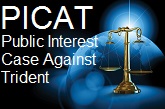
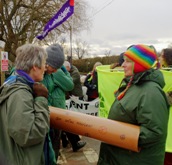








 Nuclear weapons crime in the UK has been reported to Thames Valley Police.
Nuclear weapons crime in the UK has been reported to Thames Valley Police.







